- Home
- Ken Follett
A Dangerous Fortune (1994) Page 41
A Dangerous Fortune (1994) Read online
Page 41
Edward said: "I was sitting at this very table, with Micky, when Solly came in, angry as the devil. But--"
"And that night Solly died."
"Yes--but Micky was with me all night. We played cards here, then went on to Nellie's."
"He must have left you, just for a few minutes."
"No--"
"I saw him coming into the club about the time Solly died."
"That must have been earlier."
"He may have gone to the toilet, or something."
"That hardly gives him enough time." Edward's face settled into an expression of decided skepticism.
Hugh's hopes faded again. For a moment he had succeeded in creating a doubt in Edward's mind, but it had not lasted.
"You've lost your senses," Edward went on. "Micky's not a murderer. The notion is absurd."
Hugh decided to tell him about Peter Middleton. It was an act of desperation, for if Edward refused to believe that Micky might have killed Solly eleven years ago, why would he believe that Micky had killed Peter twenty-four years ago? But Hugh had to try. "Micky killed Peter Middleton, too," he said, knowing that he was in danger of sounding wild.
"This is ridiculous!"
"You think you killed him, I know that. You ducked him repeatedly, then went chasing after Tonio; and you think that Peter was too exhausted to swim to the side, and drowned. But there's something you don't know."
Despite his skepticism, Edward was intrigued. "What?"
"Peter was a very strong swimmer."
"He was a weed!"
"Yes--but he had been practicing swimming every day that spring. He was a weed all right, but he could swim for miles. He swam to the side without difficulty--Tonio saw it."
"What ..." Edward swallowed. "What else did Tonio see?"
"While you were climbing up the side of the quarry, Micky held Peter's head under the water until he drowned."
To Hugh's surprise, Edward did not spurn the idea. Instead he said: "Why have you waited so long to tell me this?"
"I didn't think you'd believe me. I'm only telling you now out of desperation, to try to dissuade you from this latest Cordovan investment." He studied Edward's expression, and went on: "But you do believe me, don't you?"
Edward nodded.
"Why?"
"Because I know why he did it."
"Why?" said Hugh. He was inflamed by curiosity. He had wondered about this for years. "Why did Micky kill Peter?"
Edward took a long swallow of his Madeira, then he went silent. Hugh was afraid he would refuse to say any more. But eventually he spoke. "In Cordova the Mirandas are a wealthy family, but their dollars don't buy much over here. When Micky came to Windfield he spent his entire year's allowance in a few weeks. But he had boasted of his family's riches, and he was much too proud to admit the truth. So, when he ran out of money ... he stole."
Hugh remembered the scandal that had rocked the school in June of 1866. "The six gold sovereigns that were stolen from Mr. Offerton," he said wonderingly. "Micky was the thief?"
"Yes."
"Well, I'm damned."
"And Peter knew."
"How?"
"He saw Micky coming out of Offerton's study. When the theft was reported he guessed the truth. He said he would tell unless Micky owned up. We thought it was a piece of luck to catch him at the pool. When I ducked him I was trying to frighten him into silence. But I never thought ..."
"That Micky would kill him."
"And all these years he's let me think it was my fault, and he was covering up for me," Edward said. "The swine."
Hugh realized that, against the odds, he had succeeded in shaking Edward's faith in Micky. He was tempted to say Now that you know what he's like, forget about the Santamaria harbor. But he had to be careful not to overplay his hand. He decided he had said enough: Edward should be left to draw his own conclusions. Hugh stood up to go. "I'm sorry to have given you such a blow," he said.
Edward was deep in thought, rubbing his neck where the rash itched. "Yes," he said vaguely.
"I must go."
Edward said nothing. He seemed to have forgotten Hugh's existence. He was staring into his glass. Hugh looked hard at him and saw, with a jolt, that he was crying.
He went out quietly and closed the door.
Section 4
AUGUSTA LIKED being a widow. For one thing, black suited her. With her dark eyes, silver hair and black eyebrows she was quite striking in mourning clothes.
Joseph had been dead for four weeks and it was remarkable how little she missed him. She found it a little odd that he was not there to complain if the beef was underdone or the library was dusty. She dined alone once or twice a week but she had always been able to enjoy her own company. She no longer had the status of wife of the Senior Partner, but she was the mother of the new Senior Partner. And she was the dowager countess of Whitehaven. She had everything Joseph had ever given her, without the nuisance of having Joseph himself.
And she might marry again. She was fifty-eight, and no longer capable of bearing children; but she still had the desires that she thought of as girlish feelings. In fact they had got worse since Joseph's death. When Micky Miranda touched her arm, or looked into her eyes, or let his hand rest on her hip as he ushered her into a room, she felt more strongly than ever that sensation of pleasure combined with weakness that made her head spin.
Looking at herself in the drawing room mirror, she thought: We are so alike, Micky and I, even in our coloring. We would have had such pretty dark-eyed babies.
As she was thinking it, her blue-eyed, fair-haired baby came in. He was not looking well. He had gone from being stout to positively fat, and he had some kind of skin problem. He was often bad-tempered around tea-time, as the effects of the wine he had drunk at lunch wore off.
But she had something important to say to him and was in no mood to go easy on him. "What's this I hear about Emily's asking you for an annulment?" she said.
"She wants to marry someone else," Edward said dully.
"She can't--she's married to you!"
"Not really," Edward said.
What on earth was he talking about? Much as she loved him, he could be deeply irritating. "Don't be silly," she snapped. "Of course she's married to you."
"I only married her because you wanted me to. And she only agreed because her parents made her. We never loved each other, and ..." He hesitated, then blurted: "We never consummated the marriage."
So that was what he was getting at. Augusta was astonished that he had the nerve to refer directly to the sexual act: such things were not said in front of women. However, she was not surprised to learn that the marriage was a sham: she had guessed it for years. All the same she was not going to let Emily get away with this. "We can't have a scandal," she said firmly,
"It wouldn't be a scandal--"
"Of course it would," she barked, exasperated by his shortsightedness. "It would be the talk of London for a year, and it would be in all the cheap newspapers, too." Edward was Lord Whitehaven now, and a sexual sensation involving a peer was just the kind of thing featured in the weekly newspapers that servants bought.
Edward said miserably: "But don't you think Emily has a right to her freedom?"
Augusta ignored that feeble appeal to justice. "Can she force you?"
"She wants me to sign a document admitting that the marriage was never consummated. Then, apparently, it's straightforward."
"And if you don't sign?"
"Then it's more difficult. These things are not easy to prove."
"That settles it. We have nothing to worry about. Let's speak no more about this embarrassing topic."
"But--"
"Tell her she can't have an annulment. I absolutely will not hear of it."
"Very well, Mother."
She was taken aback by his rapid capitulation. Although she generally got her way in the end, he normally put up more of a fight than this. He must have other problems on his mind. "What's the
matter, Teddy?" she said in a softer voice.
He sighed heavily. "Hugh told me the devil of a thing," he said.
"What?"
"He says Micky killed Solly Greenbourne."
Augusta felt a shiver of horrid fascination. "How? Solly was run over."
"Hugh says Micky pushed him in front of that carriage."
"Do you believe it?"
"Micky was with me that evening, but he might have slipped out for a few minutes. It's possible. Do you believe it, Mother?"
Augusta nodded. Micky was dangerous and bold: it was what made him so magnetic. She had no doubt he was capable of committing such a daring murder--and getting away with it.
"I find it hard to accept," Edward said. "I know Micky is wicked in some ways, but to think he would kill...."
"He would, though," Augusta said.
"How can you be sure?"
Edward looked so pathetic that Augusta was tempted to share her own secret knowledge with him. Would it be wise? It could do no harm. The shock of Hugh's revelation seemed to have made Edward more thoughtful than usual. Perhaps the truth would be good for him. It might make him more serious. She decided to tell him. "Micky killed your uncle Seth," she said.
"Good God!"
"He suffocated him with a pillow. I caught him red-handed." Augusta felt a flush of heat in her loins as she remembered the scene that had followed.
Edward said: "But why would Micky kill Uncle Seth?"
"He was in such a hurry to get those rifles shipped to Cordova, don't you remember?"
"I remember." Edward was silent for a few moments. Augusta closed her eyes, reliving that long, wild embrace with Micky, in the room with the dead man.
Edward brought her out of her reverie. "There's something else, and it's even worse. You remember that boy Peter Middleton?"
"Certainly." Augusta would never forget him. His death had haunted the family ever since. "What about him?"
"Hugh says Micky killed him."
Now Augusta was shocked. "What? No--I can't believe that."
Edward nodded. "Deliberately held his head under the water and drowned him."
It was not the murder itself but the idea of Micky's betrayal that horrified her. "Hugh must be lying."
"He says Tonio Silva saw the whole thing."
"But that would mean Micky has been wickedly deceiving us all these years!"
"I think it's true, Mother."
Augusta realized, with a growing sense of dread, that Edward would not give credence to such a wild story without a reason. "Why are you so willing to believe what Hugh says?"
"Because I knew something Hugh didn't know, something that confirms the story. You see, Micky had stolen some money from one of the masters. Peter knew and was threatening to tell. Micky was desperate to find some way of shutting him up."
"Micky was always short of money," Augusta recalled. She shook her head in incredulity. "And all these years we've thought--"
"That it was my fault Peter died."
Augusta nodded.
Edward said: "And Micky let us think it. I can't take it in, Mother. I believed I was a killer, and Micky knew I wasn't, but he said nothing. Isn't that a terrible betrayal of friendship?"
Augusta looked sympathetically at her son. "Will you throw him over?"
"Inevitably." Edward was grief-stricken. "But he's my only friend, really."
Augusta felt close to tears. They sat looking at each other, thinking about what they had done, and why.
Edward said: "For nearly twenty-five years we've treated him as a member of the family. And he's a monster."
A monster, Augusta thought. It was true.
And yet she loved him. Even if he had killed three people, she loved Micky Miranda. Despite the way he had deceived her, she knew that if he walked into the room at this moment she would long to take him in her arms.
She looked at her son. Reading his face, she saw he felt the same way. She had known it in her heart but now her mind acknowledged it.
Edward loved Micky too.
Chapter TWO
OCTOBER
Section 1
MICKY MIRANDA was worried. He sat in the lounge of the Cowes Club smoking a cigar, wondering what he had done to offend Edward. Edward was avoiding him. He stayed away from the club, he did not go to Nellie's, and he did not even appear in Augusta's drawing room at teatime. Micky had not seen him for a week.
He had asked Augusta what was wrong but she said she did not know. She was a little odd with him and he suspected that she knew but would not say.
This had not happened in over twenty years. Every now and again Edward would take offense at something Micky did and go into a sulk, but it never lasted more than a day or two. This time it was serious--and that meant it could jeopardize the Santamaria harbor money.
In the last decade, Pilasters Bank had issued Cordovan bonds about once a year. Some of the money had been capital for railways, waterworks and mines; some had been simple loans to the government. All of it had benefited the Miranda family directly or indirectly, and Papa Miranda was now the most powerful man in Cordova, after the president.
Micky had taken a commission on everything--although nobody at the bank knew this--and he was now personally very rich. More significantly, his ability to raise the money had made him one of the most important figures in Cordovan politics and the unquestioned heir to his father's power.
And Papa was about to start a revolution.
The plans were laid. The Miranda army would dash south by rail and lay siege to the capital. There would be a simultaneous attack on Milpita, the port on the Pacific coast that served the capital.
But revolutions cost money. Papa had instructed Micky to raise the biggest loan yet, two million pounds sterling, to buy weapons and supplies for a civil war. And Papa had promised a matchless reward. When Papa was president, Micky would be prime minister, with authority over everyone except Papa himself. And he would be designated Papa's successor, to become president when Papa died.
It was everything he had ever wanted.
He would return to his own country a conquering hero, the heir to the throne, the president's right-hand man, and lord over his cousins and uncles and--most gratifyingly--his older brother.
And now all of that had been put at risk by Edward.
Edward was essential to the plan. Micky had given Pilasters an unofficial monopoly of trade with Cordova, in order to boost Edward's prestige and power at the bank. It had worked: Edward was now Senior Partner, something he could never have achieved without help. But no one else in London's financial community had got a chance to develop any expertise in Cordovan trade. Consequently the other banks felt they did not know enough to invest there. And they were doubly suspicious of any project Micky brought to them because they assumed it had already been turned down by Pilasters. Micky had tried raising money for Cordova through other banks, but they had always turned him down.
Edward's sulk was therefore deeply disquieting. It was giving Micky sleepless nights. With Augusta unwilling or unable to shed any light on the problem Micky had no one to ask: he himself was Edward's only close friend.
While he sat smoking and worrying, he spotted Hugh Pilaster. It was seven o'clock, and Hugh was in evening dress, having a drink alone, presumably on his way to meet people for dinner.
Micky did not like Hugh and he knew the feeling was mutual. However, Hugh might know what was going on. And Micky had nothing to lose by asking him. So he stood up and went over to Hugh's table. "Evening, Pilaster," he said.
"Evening, Miranda."
"Have you seen your cousin Edward lately? He seems to have vanished."
"He comes to the bank every day."
"Ah." Micky hesitated. When Hugh did not invite him to take a seat he said: "May I join you?" and sat down without waiting for a reply. In a lower voice he said: "Would you happen to know whether I've done anything to offend him?"
Hugh had looked thoughtful for a moment, then
said: "I can't think of any reason why I shouldn't tell you. Edward has discovered that you killed Peter Middleton, and you've been lying to him about it for twenty-four years."
Micky almost jumped out of his chair. How the devil had that come out? He almost asked the question, then remembered he could not without admitting his guilt. Instead he feigned anger and stood up abruptly. "I shall forget you ever said that," he said, and he left the room.
It took him only a few moments to realize that he was in no more danger from the police than he had ever been. No one could prove what he had done and it had all happened so long ago that there would be no point in reopening the investigation. The real danger he faced was that Edward would refuse to raise the two million pounds Papa needed.
He had to win Edward's forgiveness. And to do that he had to see him.
That night he could do nothing, for he was engaged to go to a diplomatic reception at the French embassy and a supper party with some Conservative members of Parliament. But the next day he went to Nellie's at lunchtime, woke April up, and persuaded her to send Edward a note, promising him "something special" if he would come to the brothel that night.
Micky took April's best room and booked Edward's current favorite, Henrietta, a slim girl with short dark hair. He instructed her to dress in a man's evening clothes with a top hat, an outfit Edward found sexy.
By half-past nine in the evening he was waiting for Edward. The room had a huge four-poster bed, two sofas, a big ornate fireplace, the usual washstand, and a series of vividly obscene paintings set in a mortuary, showing the slavering attendant performing various sexual acts on the pale corpse of a beautiful young girl. Micky reclined on a velvet sofa, wearing nothing but a silk robe, sipping brandy, with Henrietta beside him.
She quickly got bored. "Do you like these pictures?" she asked him.
He shrugged and did not answer. He did not want to talk to her. He had very little interest in women for their own sake. The sexual act itself was a humdrum mechanical process. What he liked about sex was the power it gave him. Women and men had always fallen in love with him and he never tired of using their infatuation to control, exploit and humiliate them. Even his youthful passion for Augusta Pilaster had been in part the desire to tame and ride a spirited wild mare.

 The Pillars of the Earth
The Pillars of the Earth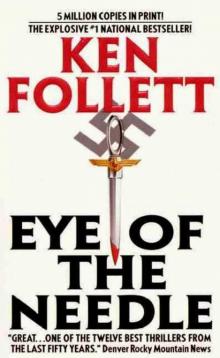 Eye Of The Needle
Eye Of The Needle Lie Down With Lions
Lie Down With Lions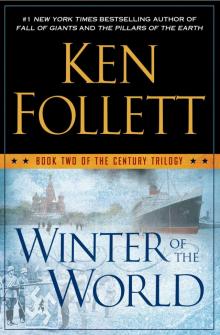 Winter of the World
Winter of the World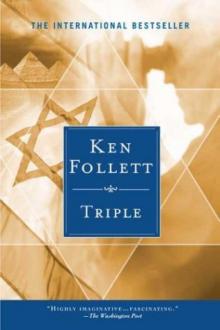 Triple
Triple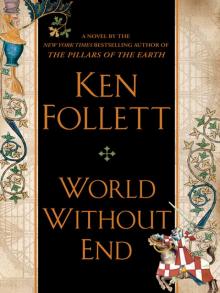 World Without End
World Without End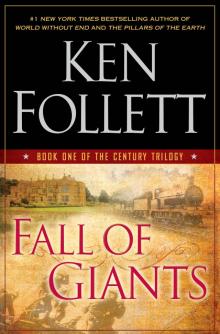 Fall of Giants
Fall of Giants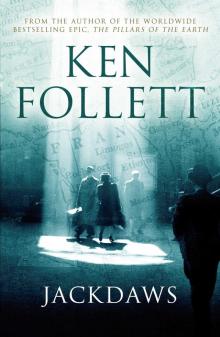 Jackdaws
Jackdaws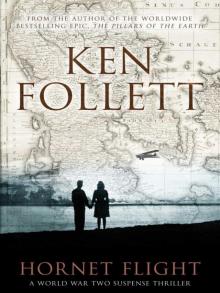 Hornet Flight
Hornet Flight Whiteout
Whiteout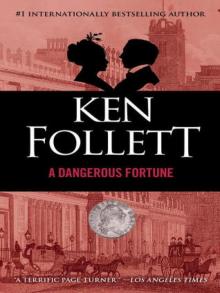 A Dangerous Fortune
A Dangerous Fortune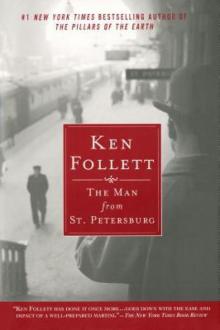 The Man From St. Petersburg
The Man From St. Petersburg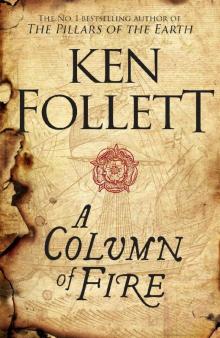 A Column of Fire
A Column of Fire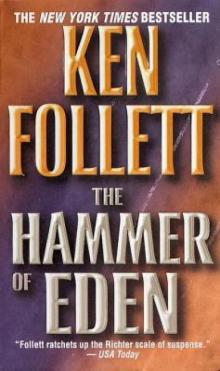 The Hammer of Eden
The Hammer of Eden On Wings of Eagles
On Wings of Eagles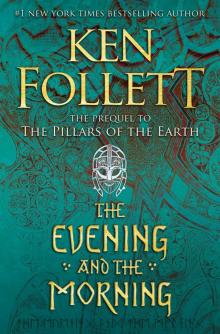 The Evening and the Morning
The Evening and the Morning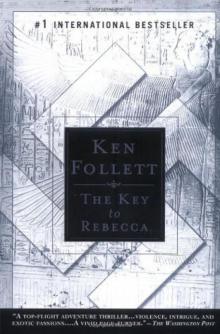 The Key to Rebecca
The Key to Rebecca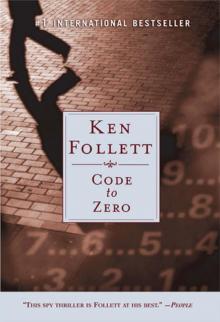 Code to Zero
Code to Zero Paper Money
Paper Money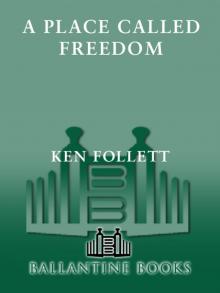 A Place Called Freedom
A Place Called Freedom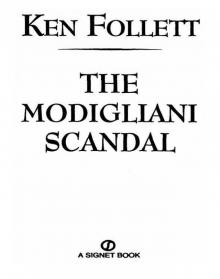 The Modigliani Scandal
The Modigliani Scandal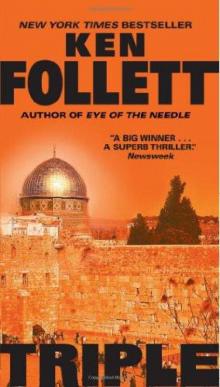 Triple (1991)
Triple (1991)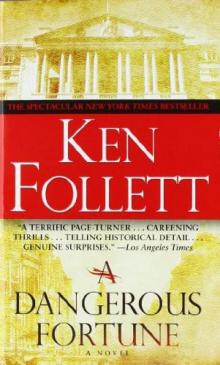 A Dangerous Fortune (1994)
A Dangerous Fortune (1994)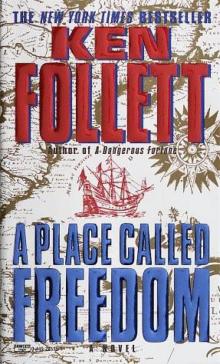 A Place Called Freedom (1995)
A Place Called Freedom (1995)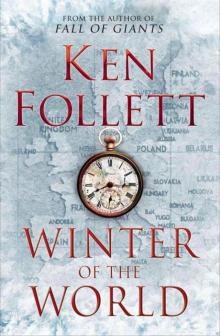 Winter of the World (Century Trilogy 2)
Winter of the World (Century Trilogy 2)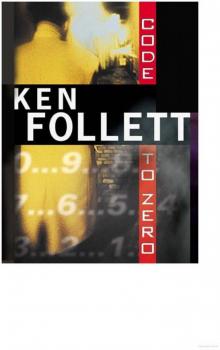 Code to Zero (2000)
Code to Zero (2000)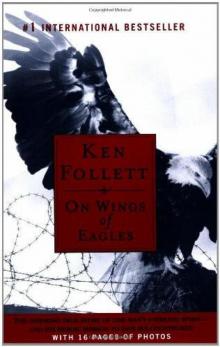 On Wings Of Eagles (1990)
On Wings Of Eagles (1990) Storm Island
Storm Island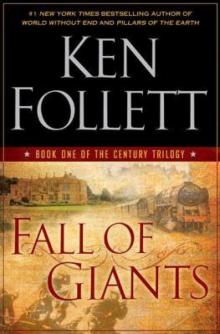 Fall of Giants (The Century Trilogy)
Fall of Giants (The Century Trilogy)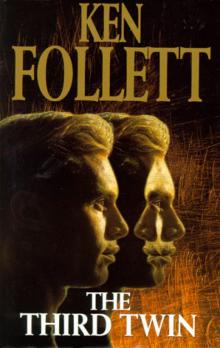 the Third Twin (1996)
the Third Twin (1996)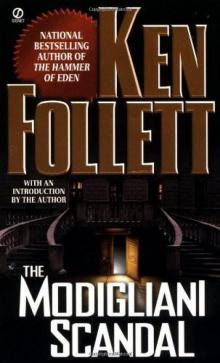 The Modigliani Scandal (1976)
The Modigliani Scandal (1976)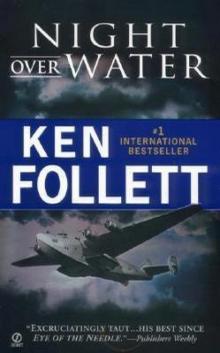 Night Over Water
Night Over Water